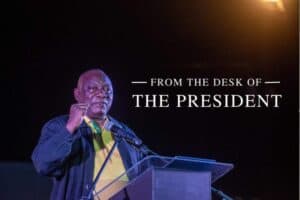The third round of public participation saw about 90% of those providing comment being opposed to changing the constitution.

In a press statement on Thursday, NGO Dear South Africa said it was “notable” that the third round of public participation hearings were indicating an overwhelming opposition to changing the constitution to allow for the expropriation of property without compensation.
DearSA said the “drastic swing” saw about 90% of participants being opposed.
In December 2019, parliament invited the public to provide written comment by 29 February on a draft amendment to the constitution catering for expropriation without compensation.
Under current South African laws, government must grant the public an opportunity to provide an influencing comment on all policy and legislative amendments before implementation.
“However, such opportunities are often inadequately announced or facilitated, and extracting outcomes information from the government is challenging.”
DearSA said they had individually delivered more than 520,000 public comments to parliament during the constitutional amendment process.
Rob Hutchinson, MD of DearSA, said: “Although we have seen a concerning overall decline in public participation in this third round, we do note an increase in opposition to the constitutional amendment.”
Participation from the “in favour” camp had significantly decreased while the “opposed” crowd had grown. Of the 190,573 who participated in the third round, 171,655 (90%) opposed the amendment, 14,870 supported it and 4,048 supported it only partially.
“In the first round of June 2018, we received over 100,000 public comments in favour of amending the Constitution – 44% of the total participants. This latest third round has seen only 14,870 (8%) directly supporting the amendment,” said Hutchinson.
The committee would now be hosting public hearings during March and April to enable those with limited access to internet or data to provide comment.
“DearSA will be closely monitoring the hearings to ensure a fair and accurate process is followed.”
What will happen after the public hearings?
The ad hoc committee will return the Bill to the National Assembly after considering all public input. The members of the National Assembly will then vote on the Eighteenth Amendment Bill. If passed, the Bill will then be brought before the National Council of Provinces (NCOP). Once passed, the law will allow for the expropriation of land and property without compensation.
Objectives of the Bill
Subsection 2 (b): Provides for a court of law to make a decision for nil compensation when land or property is expropriated for land reform.
Subsection 3: Sets out the conditions and circumstances that must be considered when a decision is made by a court regarding the amount of compensation.
Subsection 3A;:National legislation must be passed that outlines the circumstances when a court may arrive at nil compensation for expropriated land or property, eg, the Expropriation Bill.
(Compiled by Charles Cilliers)
For more news your way, download The Citizen’s app for iOS and Android.
Support Local Journalism
Add The Citizen as a Preferred Source on Google and follow us on Google News to see more of our trusted reporting in Google News and Top Stories.






